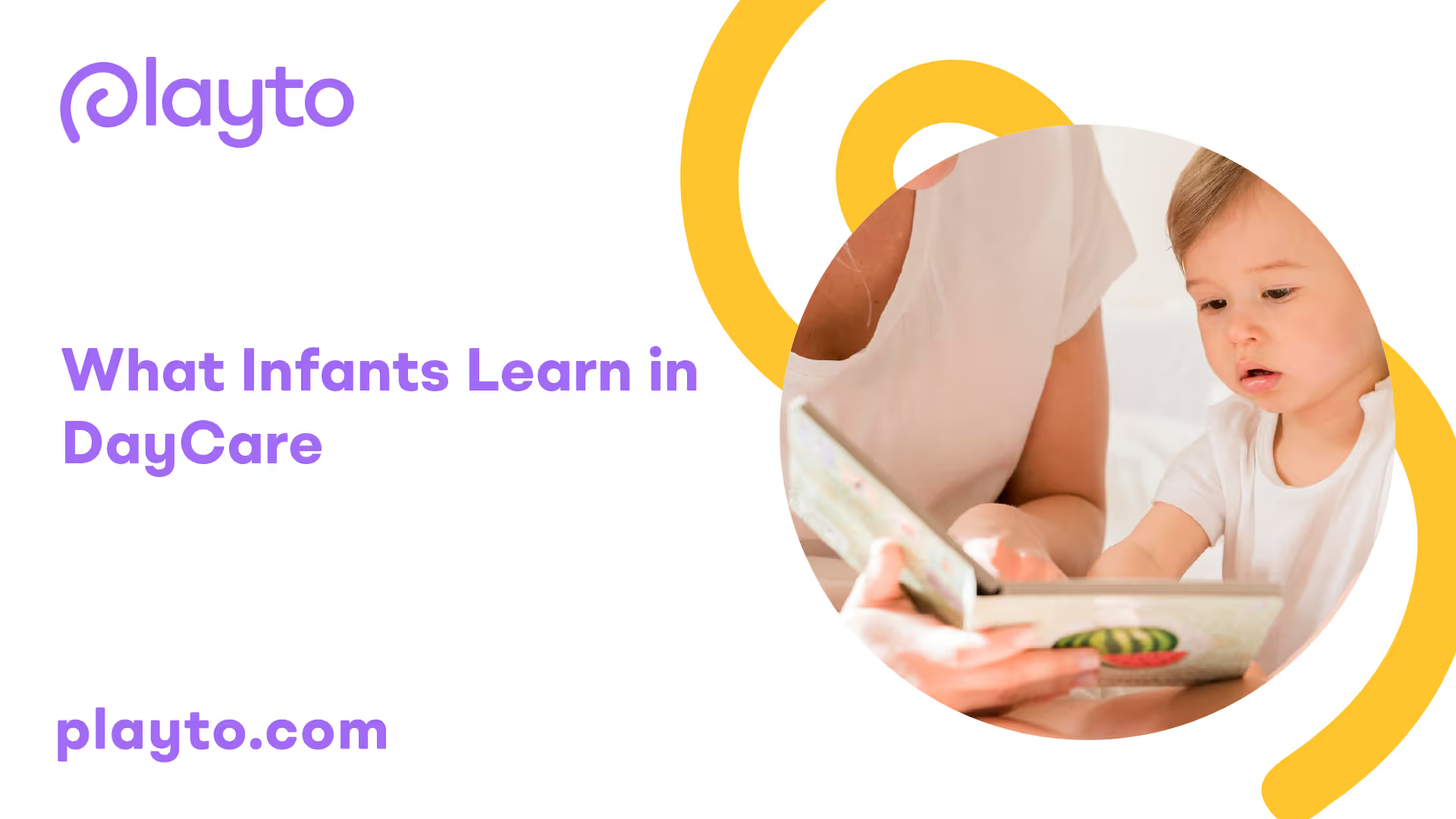
Importance of Early Learning
Early learning is a fundamental aspect of a child's development, particularly during the formative years. It lays the groundwork for future educational success and personal growth.
Developmental Milestones
During the first five years of life, children experience significant developmental milestones that shape their personalities and future trajectories. These milestones encompass various domains, including cognitive, social, emotional, and physical development. Child care activities provide the essential structure and context for infants to develop new skills and competencies, which are crucial for their growth during this critical period.
Age Range Developmental Milestone
- 0-3 Months: Begins to focus on faces, responds to sounds.
- 4-6 Months: Rolls over, begins to babble, laughs.
- 7-12 Months: Sits without support, says "mama" or "dada."
- 1-2 Years: Walks independently, follows simple instructions.
- 3-5 Years: Engages in imaginative play, understands basic concepts.
Learning Through Play
Infants learn primarily through play, which allows them to harness creativity and practice valuable linguistic, social, and cognitive skills. Play is recognized as a central teaching practice that fosters various competencies in young children, including self-regulation, language, cognitive skills, and social interaction. This highlights the critical role of play in early childhood learning.
Type of Play Skills Developed
- Sensory Play: Enhances motor skills and sensory awareness.
- Outdoor Play: Builds physical strength and social skills.
- Structured Play: Promotes cognitive development and problem-solving skills.
The first five years of learning are identified as the most important formative period, shaping children's personalities and future trajectories. Advances in neuroscience have shown that high-quality early learning experiences in infancy are crucial for promoting lifelong success through the rapid establishment of neural connections, which occur most significantly in the first three years of life. By understanding the importance of early learning and the role of play, caregivers and educators can create environments that nurture and support the growth of infants. For more information on selecting the best childcare options, see our guide on choosing the right infant daycare.

Types of Skills Developed
Infants in daycare settings develop a variety of essential skills that contribute to their overall growth and development. These skills can be categorized into cognitive, social and emotional, language, and physical skills.
Cognitive Skills
Cognitive skills are crucial for an infant's ability to think, learn, and problem-solve. In daycare, infants engage in activities that stimulate their cognitive development, such as sensory play and structured activities. Research indicates that sensory activities significantly support cognitive development, helping infants develop problem-solving skills and critical thinking abilities.
Cognitive Skills Developed Examples of Activities
- Problem-Solving: Puzzles, stacking blocks.
- Memory: Matching games, hide and seek.
- Critical Thinking: Exploration of cause and effect through toys.
Social and Emotional Skills
Social and emotional skills are vital for infants to interact effectively with others and understand their own emotions. Daycare provides opportunities for infants to engage with peers and caregivers, fostering these skills. Interactions with caregivers help infants learn to communicate, respond to challenges, and regulate their emotions.
Social and Emotional Skills Developed Examples of Activities
- Sharing: Group play activities.
- Empathy: Role-playing, comforting peers.
- Emotion Regulation: Guided play, discussions about feelings.
Language Skills
Language skills are developed through various interactions and activities in daycare. Engaging in activities like singing songs helps infants develop listening skills and an understanding of concepts such as tone and rhythm. Daycare settings also encourage infants to express themselves verbally, enhancing their vocabulary and communication abilities.
Language Skills Developed Examples of Activities
- Vocabulary: Storytime, singing.
- Listening: Interactive reading, conversation.
- Expression: Role-playing, expressive games.
Physical Skills
Physical skills encompass both fine and gross motor development. Infants engage in various activities that promote physical growth, such as crawling, standing, and grasping objects. These activities help enhance coordination and strength, which are essential for further physical development.
Physical Skills Developed Examples of Activities
- Gross Motor Skills: Crawling races, climbing structures.
- Fine Motor Skills: Finger painting, building with blocks.
- Coordination: Ball tossing, dancing.
Through engaging activities and interactions in daycare, infants develop a well-rounded skill set that prepares them for future learning and social interactions. For more insights into the positive aspects of daycare, refer to our article on the benefits of daycare for infants and tips on choosing the right infant daycare.

Role of Caregivers
In a daycare setting, caregivers play a pivotal role in shaping infants' learning experiences. Their interactions, support, and nurturing environment significantly impact infants' development.
Responsive Interactions
Responsive caregiving is crucial for infants as it fosters the development of essential neural connections related to communication and social skills. When caregivers engage in "serve and return" interactions—such as responding to a baby's babbling or crying—they help infants understand the dynamics of communication. This interaction style encourages infants to express their needs and feelings and builds a foundation for social skills.
Type of InteractionImpact on Development
- Babbling Response: Encourages vocalization and communication.
- Emotional Cues: Teaches emotional expression and understanding.
- Physical Comfort: Provides security and attachment.
Establishing Trusting Relationships
Creating trusting and caring relationships between caregivers and infants is fundamental for optimal development. When infants feel secure with their caregivers, they are more likely to ask questions and express their thoughts. This open communication fosters cognitive and emotional growth. Providing consistent warmth and affection, even during challenging moments, helps develop secure attachments, which positively influences interactions with peers.
Relationship Quality Benefits
- Trusting Bonds: Encourages exploration and learning.
- Emotional Security: Reduces anxiety and promotes social skills.
Supporting Emotional Health
Caregivers also play a vital role in supporting infants' emotional health. Through nurturing relationships, infants learn to identify and regulate their emotions. Caregivers model appropriate behaviors and provide cues that enhance social interactions and emotional understanding. This guidance helps infants develop the ability to form positive relationships with others, which is crucial for their overall social and emotional well-being.
Emotional Support Strategies Outcomes
- Modeling Behaviors: Improves social skills.
- Providing Cues: Enhances emotional understanding.
- Consistent Affection: Builds secure attachments.
The role of caregivers in daycare extends beyond mere supervision. Their responsive interactions, ability to establish trusting relationships, and support for emotional health are fundamental components in what infants learn in daycare. For more insights on selecting the best daycare options, consider exploring our article on choosing the right infant daycare.
Activities for Learning
Infants in daycare benefit significantly from engaging in various activities that promote learning and development. These activities include sensory play, outdoor exploration, and structured playtime. Each of these experiences contributes uniquely to an infant's growth.
Sensory Play
Sensory play is crucial in the early years of child development. It helps build neural pathways that are essential for more complex learning tasks as children grow. Research indicates that sensory activities support several areas of development, including:
Developmental Area Benefits
- Language Acquisition: Enhances vocabulary through interactive play.
- Cognitive Development: Encourages problem-solving and critical thinking skills.
- Social Interaction: Fosters communication and teamwork among peers.
- Emotional Skills: Aids in expressing feelings and understanding emotions.
- Fine and Gross Motor Skills: Develops dexterity and coordination.
Caregivers are encouraged to provide daily opportunities for infants to engage in sensory activities, as these experiences significantly contribute to their physical and sensory development.
Outdoor Exploration
Outdoor exploration plays a vital role in an infant's learning and development. Caregivers are urged to facilitate daily experiences with living things and natural environments. These activities not only enhance physical development but also promote sensory experiences that are crucial for overall growth.
Research shows that children who engage in outdoor play regularly exhibit:
Benefit Description
- Active Imaginations: Greater creativity and imaginative play.
- Lower Stress Levels: Enhanced emotional well-being.
- Greater Self-Respect: Increased confidence through exploration.
These benefits highlight the importance of outdoor interactions in daycare settings. Engaging with nature allows infants to explore their surroundings, fostering curiosity and discovery.
Structured Playtime
Structured playtime is essential for infants as it provides opportunities for learning in a guided setting. An effective infant-toddler care and learning environment should accommodate children at their current developmental levels, providing appropriate challenges and encouraging the development of new skills through diverse interactions supported by responsive caregivers.
Structured play activities may include:
- Storytime: Encourages language skills and cognitive development.
- Music and Movement: Enhances coordination and social skills.
- Art Projects: Fosters creativity and fine motor skills.
Through structured playtime, caregivers can facilitate meaningful learning experiences, ensuring that infants are engaged and supported in their developmental journey. For more information on the benefits of daycare for infants, explore our related resources.
Benefits of Daycare
Daycare can provide significant advantages for infants, contributing to their overall development. The benefits can be particularly noteworthy in terms of long-term educational outcomes, behavioral improvements, and enhanced social skills.
Long-Term Educational Outcomes
Quality early education in daycare settings is linked to higher levels of educational attainment and improved adult life outcomes. Research indicates that infants who receive high-quality care are less likely to experience behavioral and emotional issues as they grow older.
Outcome Impact
- Educational Attainment: Higher levels of education achieved.
- Adult Life Outcomes: Better job stability and satisfaction.
- Behavioral Issues: Reduced incidence of behavioral problems.
Behavioral Improvements
Children with social and emotional difficulties often struggle to follow directions and engage in learning activities, leading to potential academic challenges. Daycare can help mitigate these issues by fostering a supportive environment where infants can learn healthy emotional responses and social interactions.
Improvement Description
- Following Directions: Enhanced ability to listen and respond to instructions.
- Participation: Increased engagement in activities and cooperative play.
- Emotional Regulation: Development of skills to manage emotions appropriately.
Enhanced Social Skills
Consistent caregiving relationships in daycare are essential for developing social skills. Research shows that caregiver stability—having fewer sequential caregivers from 6 to 36 months—positively correlates with higher social skills in kindergarten. This consistency helps infants form secure attachments and learn to interact effectively with peers.
Skill Benefit
- Communication: Improved verbal interactions and language development.
- Peer Interaction: Enhanced ability to play and share with others.
- Trust Development: Strengthened relationships with caregivers and peers.
Daycare not only provides a structured environment for learning but also equips infants with essential skills that lay the groundwork for their future educational experiences. For more information on selecting the best care for your child, visit our guide on choosing the right infant daycare.
Choosing the Right Daycare
Selecting the appropriate daycare for infants is crucial for their development and overall well-being. Parents should consider various factors, including quality indicators, caregiver consistency, and the environment and activities provided.
Quality Indicators
High-quality early education significantly impacts a child's future. According to Procare Software, such education leads to higher levels of educational attainment and better adult life outcomes. Key quality indicators to assess include:
Indicator Description
- Caregiver Qualifications: Educational background and training in early childhood education.
- Staff-to-Child Ratio: Lower ratios allow for more individualized attention.
- Learning Environment: Safe, engaging, and developmentally appropriate spaces.
- Curriculum: Structured activities that promote learning through play and exploration.
Caregiver Consistency
Caregiver stability plays a vital role in a child's social development. Research indicates that having fewer sequential caregivers from 6 to 36 months is positively associated with higher social skills in kindergarten. Parents should look for daycare centers that prioritize:
Factor Importance
- Low Turnover Rates: Consistent caregivers foster trusting relationships.
- Long-Term Staff: Stability in caregiving provides a sense of security for infants.
- Responsive Care: Caregivers should adapt interactions based on each child's needs and preferences.
Environment and Activities
The environment and activities offered in daycare should cater to an infant's developmental levels. An appropriate setting encourages skill development through diverse interactions. Essential aspects include:
Aspect Description
- Safe Space: Well-maintained facilities that meet safety standards.
- Sensory Experiences: Opportunities for infants to explore various materials to stimulate their senses.
- Structured and Unstructured Play: A mix of guided activities and free play to promote creativity and learning.
By focusing on these factors, parents can ensure they choose a daycare that supports their child's growth and development. For more insights, check out our article on choosing the right infant daycare.
References
- [1]: https://www.procaresoftware.com/blog/educational-child-care-activities-to-accelerate-early-learning/
- [2]: https://www.naeyc.org/resources/position-statements/dap/principles
- [3]: https://www.procaresoftware.com/blog/list-of-sensory-activities-for-infants-toddlers/
- [4]: https://www.virtuallabschool.org/infant-toddler/social-and-emotional-development/
- [5]: https://www.naeyc.org/resources/pubs/promoting-social-and-emotional-health
- [6]: https://www.virtuallabschool.org/infant-toddler/physical-development/
- [7]: https://www.ncbi.nlm.nih.gov/pmc/articles/PMC7793551/
